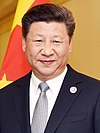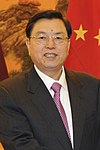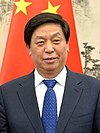
The Politburo Standing Committee (PSC), officially the Standing Committee of the Political Bureau of the Central Committee of the Communist Party of China, is a committee consisting of the top leadership of the Chinese Communist Party (CCP). Historically it has been composed of five to eleven members, and currently has seven members. Its officially mandated purpose is to conduct policy discussions and make decisions on major issues when the Politburo, a larger decision-making body, is not in session. According to the party's constitution, the General Secretary of the Central Committee must also be a member of the Politburo Standing Committee.

The Constitution of the People's Republic of China is the supreme law of the People's Republic of China. It was adopted by the 5th National People's Congress on December 4, 1982, with further revisions about every five years. It is the fourth constitution in PRC history, superseding the 1954 constitution, the 1975 constitution, and the 1978 constitution.

The general secretary of the Central Committee of the Chinese Communist Party is the leader of the Chinese Communist Party (CCP), the sole ruling party of the People's Republic of China (PRC). Since 1989, the CCP general secretary has been the paramount leader of the PRC.

Li Keqiang was a Chinese economist and politician who served as the premier of China from 2013 to 2023. He was also the second-ranked member of the Politburo Standing Committee of the Chinese Communist Party (CCP) from 2012 to 2022. Li was a major part of the "fifth generation of Chinese leadership" along with Xi Jinping, the CCP general secretary.

The vice president of China, officially titled the vice president of the People's Republic of China, is the deputy to the president of the People's Republic of China, the state representative of China.
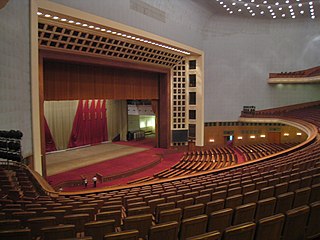
The 17th National Congress of the Chinese Communist Party was held in Beijing, China, at the Great Hall of the People from 15 to 21 October 2007. Congress marked a significant shift in the political direction of the country as CCP General Secretary Hu Jintao solidified his position of leadership. Hu's signature policy doctrine, the Scientific Development Concept, which aimed to create a "Socialist Harmonious Society" through egalitarian wealth distribution and concern for the country's less well-off, was enshrined into the Party Constitution. It was succeeded by the 18th National Congress of the Chinese Communist Party.

Li Zhanshu is a Chinese retired politician, who was the chairman of the Standing Committee of the National People's Congress from 2018 to 2023. He was the third-ranking member of the Politburo Standing Committee of the Chinese Communist Party, China's top decision-making body, between 2017 and 2022.
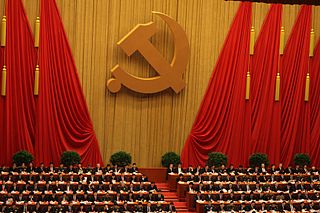
The 18th National Congress of the Chinese Communist Party was held November 8–14, 2012 at the Great Hall of the People. Due to term limits and age restrictions, seven of the nine members of the powerful Politburo Standing Committee (PSC) retired during the Congress, including Hu Jintao, who was replaced by Xi Jinping as General Secretary of the Chinese Communist Party. The Congress elected the 18th Central Committee of the Chinese Communist Party, and saw the number of Politburo Standing Committee seats reduced from nine to seven.

The Xi–Li Administration was the administration of China from 2013 to 2023. Xi Jinping and Li Keqiang succeeded Hu Jintao and Wen Jiabao after the 12th National People's Congress.

The Central Financial and Economic Affairs Commission is a commission of the Central Committee of the Chinese Communist Party in charge of leading and supervising economic work of both the CCP Central Committee and the State Council. The Commission is generally headed by CCP General Secretary or Premier of the State Council.

The Li Keqiang Government was the Central People's Government of China from 15 March 2013, when Premier Li Keqiang took office, until March 2023. It succeeded the Wen Jiabao government. Premier Li was ranked only second to Party general secretary Xi Jinping among 7 members of the 18th and 19th Politburo Standing Committee, top decision-making body of the Chinese Communist Party (CCP).

The president of China, officially titled the president of the People's Republic of China, is the state representative of the People's Republic of China. On its own, it is a ceremonial office and has no real power in China's political system. While the office has many of the characteristics of a head of state, the Chinese constitution does not define it as such. However, since 1993, the post has been held by the general secretary of the Chinese Communist Party (CCP) and chairman of the Central Military Commission, who is China's de facto leader.

The 19th National Congress of the Chinese Communist Party was held at the Great Hall of the People, Beijing, between 18 and 24 October 2017. 2,280 delegates represented the party's estimated 89 million members. Preparations for the 19th National Congress began in 2016 and ended with a plenary session of the Central Committee a few days prior to the Congress. In 2016, local and provincial party organizations began electing delegates to the congress as well as receiving and amending party documents. It was succeeded by the 20th National Congress of the Chinese Communist Party.

The 13th National People's Congress (NPC) was elected from October 2017 to February 2018 and was in session in the five-year period from 2018 to 2023. It held five sessions in this period, occurring around early March every year until before 2023, when the 14th National People's Congress first convened.

The 20th National Congress of the Chinese Communist Party (CCP), commonly referred to as Èrshí Dà, was held in the Great Hall of the People, Beijing from 16 to 22 October 2022. The National Congress is the highest organ of the party, and is stipulated to be held every five years. The conference had 2,296 delegates and 83 specially invited delegates.
The 20th Politburo of the Chinese Communist Party (CCP), formally the Political Bureau of the 20th Central Committee of the Communist Party of China, was elected at the 1st Plenary Session of the 20th Central Committee of the CCP on 23 October 2022 in the aftermath of the 20th National Congress. This electoral term was preceded by the 19th Politburo. Seven of the 24 members serve in the 20th Politburo Standing Committee.
The 2023 National People's Congress, officially the First Session of the 14th National People's Congress, was held in March 2023 at the Great Hall of the People in Beijing, China. The session opened on 5 March and concluded on 13 March. Major state positions of China were elected in this session.

The 14th National People's Congress (NPC) is the sitting electoral term of the "supreme organ of state power" of the People's Republic of China. It convened in Beijing, on 5 March 2023, and is scheduled to continue until March 2028. Elections for the new Congress were held from October 2022 to February 2023. It is scheduled to hold five sessions in this period, occurring around early March every year until before 2028, when the 15th National People's Congress is expected to be elected from December 2027 to February 2028 and will likely be in session around March 2028.
The 19th Politburo Standing Committee of the Chinese Communist Party, formally the Standing Committee of the Political Bureau of the 19th Central Committee of the Communist Party of China, was elected by the 1st Plenary Session of the 19th Central Committee on 25 October 2017, in the aftermath of the 19th National Congress of the Chinese Communist Party (CCP). It was preceded by the CCP's 18th Politburo Standing Committee and was succeeded by the 20th in October 2022.

The Press Conference of the Premier of the State Council, also known as the "Premier's Q&A with Journalists", is a meeting held by the Premier of the State Council, who serves as the head of government of China, with both domestic and foreign journalists. The Premier's press conference started in 1988 when Premier Li Peng accepted an invitation from the spokesperson of the 7th National People's Congress, Zeng Tao, to meet with journalists from mainland China, Hong Kong, Macau, Taiwan, and foreign countries.

